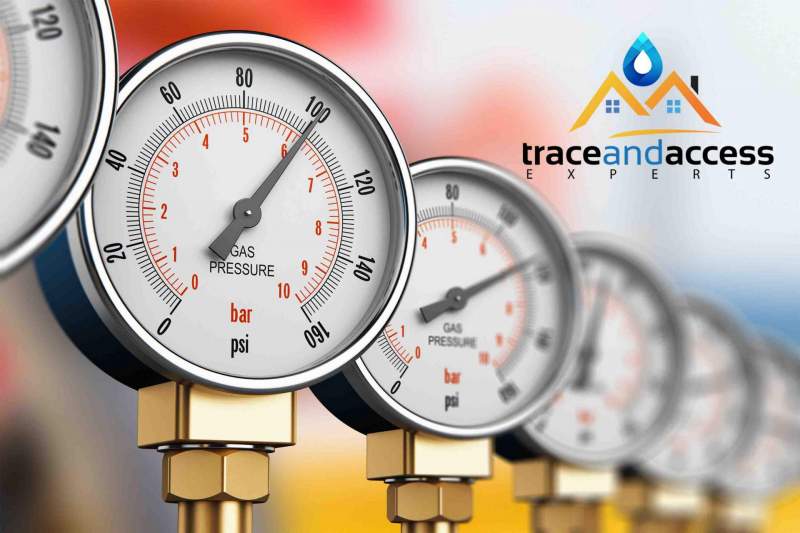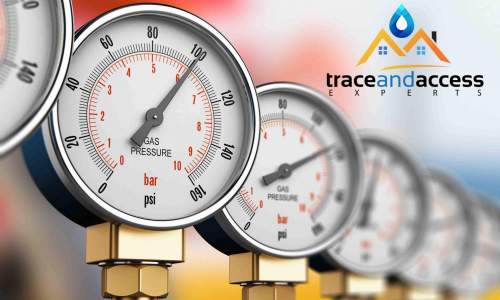
Does the central heating system pressure gauge continuously show that you are losing pressure? Do you find yourself forever topping up your central heating system? Are you concerned that you may have a water leak?
Well, you’ve made a good start in getting some answers to those questions by coming to the right place for help!
 The first thing to understand is that a drop of pressure (let’s say, from about 1.5 bar down to about 0.5 bar in a typical system) represents a loss of water of probably only about three litres or so: not a lot if spread out over a few days! In fact, over the course of a week, that pressure drop represents a loss of water of slightly more than a tablespoon of water an hour – not a lot!
The first thing to understand is that a drop of pressure (let’s say, from about 1.5 bar down to about 0.5 bar in a typical system) represents a loss of water of probably only about three litres or so: not a lot if spread out over a few days! In fact, over the course of a week, that pressure drop represents a loss of water of slightly more than a tablespoon of water an hour – not a lot!
However, a water leak is a leak and that (small amount of) water is going somewhere and even a tablespoon of water an hour in the wrong place can, over time, cause a lot of damage.
Video demonstrating how every drip adds-up! By Trace and Access Experts
It’s natural to think that the water must be leaking from the pipework, often at joint, buried under the floor or in some equally inaccessible place and indeed this may be the case.
There are though, several other places that the water can be leaking from and it is always worth getting these checked first before asking us to trace and access any leaks from the central heating pipework. These include:
The boiler pressure relief valve (PRV): This is designed to protect against too HIGH a system pressure by letting water escape by pushing against a spring if pressures are more than about 3 bar. It often fails by letting water dribble continuously past it in just the same way as a pipe leak.
This can be checked by looking for the PRV pipe emerging from an exterior wall near the boiler – and typically behind a bush! – and making sure that the end of the pipe is not dribbling water. Sealing a plastic bag over the end of the pipe lets you check for water over a longer period.
Expansion vessel:
This is a small metal tank, usually red in colour, often located either in or near the boiler or near the hot water cylinder, in which a rubber sheet, or diaphragm, separates central heating water from pressurised air and this can leak allowing water to escape into the ‘air only’ part.
There is a usually a Schrader valve – like a bicycle tyre valve – on the tank. If the middle of this pushed and water comes out, the diaphragm has ruptured and is probably the cause of the leak. Note that the air in the vessel should be pressurised to about 1 – 1.5 bar
Radiator valves:
Valves on either end of a radiator (both TRVs and lock shield valves) can leak; if it’s a big leak, it’s usually very obvious as water can be seen running down the pipe and soaking the carpet. However, if the leak is very small the escaping water immediately evaporates from the hot pipe so the area looks dry. Sometimes, this can happen on several radiators at the same time and the cumulative effect of these tiny leaks can be what is causing the system pressure loss.
This can be checked by wrapping some tissue paper around all the radiator valve joints and seeing if it gets damp or crinkled.
Automatic Air Vents:
More uncommon, but if too much air or gas is being generated in the central heating system, it will escape from the air vent and cause a pressure loss.
This can be checked by temporarily tightening the cap (it looks like a bicycle tyre valve cap and can be either brass or plastic) and seeing if the pressure drop stops.
Heat Exchanger:
Rarely, the heat exchanger in the boiler can leak and it is sometimes obvious if this happening as there will be a pool of water under the boiler. Otherwise, and especially on newer boilers, the water runs out of the condensate pipe that should be passing water in any event.
This is harder to check, but the condensate pipe should be passing water only when the boiler is running; if there is a steady trickle of water coming out when the boiler is cold, this could be the source of the dropping pressure.
Hot Water cylinder:
Rarely, the heating coil in the hot water cylinder can leak with the result that water from the central heating mixes with hot water coming out of the hot tap.
Often, the hot water will be slightly discoloured.
If those things have been checked (especially the PRV, expansion vessel and radiator valves) and the pressure is still dropping, then a leak from the pipework would seem likely - and that is where we come in! Our leak detection specialists will trace the leak in a non-destructive fashion, using thermal, acoustic, moisture mapping and tracer gas techniques mixed with that most essential of ingredients – experience! and then access, or expose, the leaking joint or pipe.
If in doubt, or just want some advice, do give us a call at Trace and Access Experts


